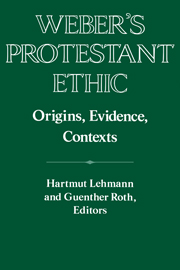Book contents
- Frontmatter
- Introduction
- Part I Background and Context
- 1 The German Theological Sources and Protestant Church Politics
- 2 The Thesis before Weber: An Archaeology
- 3 Max Weber, Protestantism, and the Debate around 1900
- 4 Weber the Would-Be Englishman: Anglophilia and Family History
- 5 Weber's Historical Concept of National Identity
- 6 Nietzsche's Monastery for Freer Spirits and Weber's Sect
- 7 Weber's Ascetic Practices of the Self
- 8 The Protestant Ethic versus the “New Ethic”
- 9 The Rise of Capitalism: Weber versus Sombart
- Part II Reception and Response
- Index
4 - Weber the Would-Be Englishman: Anglophilia and Family History
Published online by Cambridge University Press: 05 January 2013
- Frontmatter
- Introduction
- Part I Background and Context
- 1 The German Theological Sources and Protestant Church Politics
- 2 The Thesis before Weber: An Archaeology
- 3 Max Weber, Protestantism, and the Debate around 1900
- 4 Weber the Would-Be Englishman: Anglophilia and Family History
- 5 Weber's Historical Concept of National Identity
- 6 Nietzsche's Monastery for Freer Spirits and Weber's Sect
- 7 Weber's Ascetic Practices of the Self
- 8 The Protestant Ethic versus the “New Ethic”
- 9 The Rise of Capitalism: Weber versus Sombart
- Part II Reception and Response
- Index
Summary
Since the Napoleonic period, England had been for many German liberals the “older brother” who could show a way out of the confusions of French history and the frustrations of German history. After German unification in 1871, the number of liberal admirers gradually declined, until the stage was set for Germany's fatal challenge to the British Empire. Max Weber was one of the last to consider England a model for both constitutional reform and Weltpolitik. The hatred he felt for his Lutheran heritage and the German authoritarian realities was so great that he modeled his notion of ethical personality and innerworldly asceticism to a considerable extent after an idealized image of English history, especially of Puritanism.
Although a vigorous spokesman of his generation's nationalism, Weber greatly sympathized with the Puritan and liberal traditions of England. Sometimes he sounded as if he were half English. Indeed, more than elective affinity is involved. Weber was a descendant of the cosmopolitan bourgeoisie. His ancestors and relatives were businessmen in Manchester and London, not just in Frankfurt and Bielefeld. Three generations moved back and forth; some members returned to Germany, others stayed on. Weber could view himself, if he wished, as a would-be Englishman and in a romantic dream as one of the admired Herrenmenschen (masters), Puritan or not. He too had some links, if tenuously, with the “commercial aristocracy” that made Lancashire the cradle of the modern factory system. By a last stretch of the imagination, he could envisage himself as a liberal party leader in Birmingham or Manchester, a Joseph Chamberlain or a William Ewart Gladstone.
- Type
- Chapter
- Information
- Weber's Protestant EthicOrigins, Evidence, Contexts, pp. 83 - 122Publisher: Cambridge University PressPrint publication year: 1993
- 11
- Cited by



